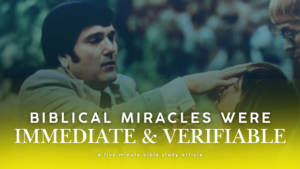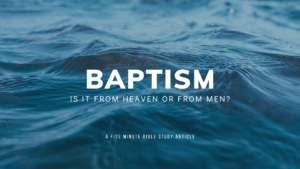![[Tags] Is-America-A-Christian-Nation-Not-Guilty-1024x576 America is a Christian Nation: Not Guilty (Pt. 2)](https://fiveminutebiblestudy.com/wp-content/uploads/2021/03/Is-America-A-Christian-Nation-Not-Guilty-1024x576.png)
America is not guilty of being a Christian nation, and it never has been. There it is. I said it. A conservative preacher, from America, brought up being taught Christian based homeschool curriculum through 10th grade, just denied that America is a Christian nation. Honestly, I don’t know if there was a point in time that I ever stopped believing one way and started believing another about America’s Christian cloth. I know that if I had taken to the bank every word from the Abeka history books I read growing up, I certainly would have to believe differently than I do now. But there is a nagging issue that has perpetually gnawed at me in this debate. The pesky issue is captured by one of the questions John Fea put forth as a rule of measurement for grading a nation as Christian or otherwise: “Did the behavior, practice, and decisions of the founders and the governments they established conform to the spiritual and moral teachings of Christianity as taught in scripture?” A brief journey back through the pages of American history should lead anyone, if they are being fair and honest I believe, to answer this question in the negative. In the spirit of being fair and honest, let’s take a look at some of the historical evidences. For the sake of brevity, I have chosen to limit the historical evidences against a Christian America to the following categories: 1) Native American Indians, 2) black chattel slavery, and 3) insubordination to human government.
1. Treatment of Native American Indians
From what I can remember of the Abeka history books I read as a kid, they would always spend a solid amount of time telling about the early Puritan and Pilgrim settlers to the New World. Names like Myles Standish and Roger Williams still have a ring of familiarity to them just from reading about them again and again, year after year. But one thing I never remember reading about was the way that Native American Indians were viewed in the New World and especially how they were treated by the settlers. To preface the historical facts I am going to share about the colonists’ treatment of Native Americans, consider a couple of verses.
1 Peter 2:17
“Honor all people. Love the brotherhood. Fear God. Honor the king.”
Here, Peter gives a general plea to Christians that they show respect to every single human being regardless of who they are. Jesus taught the same lesson in parable form when asked by a conniving Jewish lawyer, “Who is my neighbor?” (Luke 10:29). Just prior to the silly question, Jesus had explained one of the most foundational commandments of scripture “love your neighbor as yourself” (v. 27). The lawyer was fishing for a loophole in the law. He was trying his hand at some sort of grammatical ventriloquism in order to get around having to treat all men of all races and social statuses with equal dignity, especially the lowly Samaritans. Jesus denies the lawyer any foothold by telling him by way of the Good Samaritan story that, your neighbor is anyone and everyone you come in contact with.
The Puritans, Pilgrims, and Anglicans that settled the New England colonies should have been very familiar with the “love your neighbor as yourself” law of Christ. And yet, we find that they unapologetically denied this law. Quoting from Fea, “Roger Williams criticized the government of Massachusetts Bay for taking Indian land without paying for it. Since they understood themselves to be the new Israel, Puritans believed that it was their God-ordained right to usurp this Indian land,” (90). Speaking more about the Puritans, Fea says, “The Puritans made every effort to try to convert the American Indians to Christianity, and some missionaries were successful in these attempts. But in the end the Puritan approach to Indians living in their midst must be viewed as embarrassing for a society that claimed to be Christian in orientation. There was no attempt, for example, to treat the Indians as fellow human beings, created in the image of the same God that the Puritans worshiped. There were few attempts to treat the Indians fairly and justly. Instead, Puritan-Indian relations reveal the selfishness and greed of the Puritans and their attempts to extend their society westward at all costs,” (91).
Looking at the modern state of Native American Indians in North America, it is easy to see that this description of early settler’s treatment of the native people is in keeping with what we can observe. Today, not only do proponents of a Christian America typically not even flinch when reviewing the supposed Christian character of the early colonists, they loudly protest the entrance of illegal immigrants across the nation’s southern border. This is not meant to provoke a political debate about America’s 21st century immigration policy, but it is meant to show the hypocrisy of the Christian America platform as I shall call it, a platform that proudly reminisces how their ancestors illegally and inhumanely confiscated the homeland of the Native American Indians, while being immigrants themselves.
2. Black Chattel Slavery
The history of America’s fostering black chattel slavery may serve as the most insurmountable obstacle facing the Christian America position. Not only does America in general have a history of perpetuating this inhumane and unholy practice, oh so many of the very individuals upholding the slave system were so called Christians. During the Civil War, the South, by and large, believed that God was on their side. That being the case, they had to somehow get God on the side of their pro-slavery society, and so their common response to the North’s accusations was that, “Nowhere in the New Testament…did the Bible condemn slavery,” (Fea 18). While as, there is no “thou shalt not” passage against slavery in the New Testament, an honest reader cannot finish the 27 letters and still condone Southern, antebellum slavery.
The institution of African slave trade itself was forged as a solution to the conflict between the wealthy and underclass ranks of the colonies (Ibid. 84). “Relations between the freemen and the government improved, thanks to the introduction of slavery, and the colony (Jamestown) finally reached a level of stability and order that was absent during the first fifty or so years of settlement,” (Ibid. 84). In short, white indentured servanthood gave place to black chattel slavery. In Jamestown, we are talking about a colony settled by Anglicans (members of the Church of England), whose government required all citizens to attend a local church every Sunday. It soon became a colony that frowned on its citizens for skipping church, but could care less if those same citizens owned and brutishly treated black men and women as less than human: another gold star for Christian America. Little would change over the next 200 years.
Moving closer to the framing of the nation’s constitution, it would appear that Christian attitudes towards the equal dignity of all human beings did not improve. The Anti-Federalists were a party of men who, along with opposing the nature of the constitution, were predominantly composed of quote, unquote “Christians.” Fea says about this party at the time of the constitution’s framing, “Anti-Federalists especially attacked Article VI because it placed no Christian qualifications on officeholders,” (Ibid. 159). He goes on to cite a New York Anti-Federalist who expressed the following fears about the kinds of men that would be allowed service in the national government due to Article VI:
1st Quakers, who will make the black saucy and at the same time deprive us of the means of defence-2dly, Mahometans, who ridicule the doctrine of the trinity-3dly. Deists, abominable wretches-4thly, Negroes, the seed of Cain-5thly Beggars, who when set on horseback, will ride to the devil-6thly, Jews & c. & c…. (Ibid. 159).
I think the quote says enough without any added commentary. While one could argue, “Well, you can’t base an entire community off of one fool,” I would ask how one then distinguishes the strong held convictions of the just quoted Mr. Curtopolis with the longstanding history of so called Christians vying for and perpetuating black slavery. The burden of proof is too heavy to overcome in my estimation. The case for a Christian America fails the test once again.
3. Insubordination to Human Government
The last item on the list revolves around the nature of the Revolutionary War. To be clear from the outset, I am a pacifist. I believe that all war in this era is anti-Christian by its very nature. But I will dance for a few sentences as if war is not anti-Christian. Nevertheless, the Revolutionary War, above all other American wars, can in no way classify as a Christian event. Why? Because the very heart of the American Revolution was a rejection of the English government, the government under which the American colonists were rightfully subject to until 1776. From a Christian perspective, the Revolution has all the trappings of dishonor and rebellion against God ordained authority.
1 Peter 2:13-14
“Therefore submit yourselves to every ordinance of man for the Lord’s sake, whether to the king as supreme, or to governors, as to those who are sent by him for the punishment of evildoers and for the praise of those who do good.”
So called colonial Christians refused to submit to the government of the motherland, and as you can imagine, they concocted some way of getting God on their side. The passage just quoted along with the famous Pauline appeal to submit to human government in Romans 13:1-7, became hotly debated scriptures among the clergy surrounding the Revolution (Ibid. 115). Fea outlines a sermon by the minister of Boston’s West Church named Jonathan Mayhew who advocated for America’s rebellion against England. After outlining Mayhew’s sermon, Fea observes, “Perhaps the most ironic thing about Mayhew’s argument is the way he managed to transform Romans 13 from a verse teaching submission to authority into a verse justifying the execution of Charles I and, for that matter, all rebellion against tyrannical government,” (Ibid. 117). Mayhew’s electric views are indeed perplexing given that Paul wrote his letter to the Romans while living under the rule of the most tyrannical Emperor Nero; yet, Paul never used his apostolic influence among the churches or society to orchestrate a coup against Rome or the execution of Christian enemy #1: the emperor.
To be fair, Jonathan Mayhew does not stand to represent all American clergy at that time. John Wesley, the founder of Methodism, was outspoken against the American Revolutionary cause, even accusing colonists of “(holding) African slaves even as they cried for their own freedom from English tyranny,” (Ibid. 120). Wesley did not hold back on calling out the colony’s sins to include the refusal to pay taxes (Ibid. 120). Perhaps the most famous act of rebellion in that time, the Boston Tea Party, was in direct violation of Paul’s command to, “Render therefore to all their due: taxes to whom taxes are due, customs to whom customs, fear to whom fear, honor to whom honor,” (Rom. 13:7). All in all, while there may have been a few John Wesleys at large in the 1700’s, it is safe to say that they were the minority. Wesley certainly did not define the American attitude of that time, nor does he in any way represent the modern Christian attitude toward the American Revolution today. You will be hard pressed to find many stated Christians today who recognize the Revolution for what it was, an unholy act of rebellion against God ordained authority: human government.
Conclusion
Need I say more? Certainly, anyone who wants to call good evil and evil good, all while lifting their hands to heaven above, will find a way to do it and lay their head down on the pillow at night. The evidence against a Christian American heritage above will not be sufficient in overturning the mind of the person that wants to see red, white, blue, and Christ. No amount of blood shed, Indian scalps, whip ridden slaves, or slurs against King George will be enough to convince some that America was not, in fact, founded as a Christian nation. But for those that do have honest hearts: acknowledge that God has not forsaken the United States. After all, you can’t forsake something that you never claimed in the first place. To alliance God with the sinful history of our nation is to deny God’s character and method of operation that we see under the Old Testament as He dealt with Israel. In Pt. 3 of this brief article series, we will examine how God’s relationship with Israel was extremely unique and how the very idea of America being a nation unto God like Israel is inconceivable.


